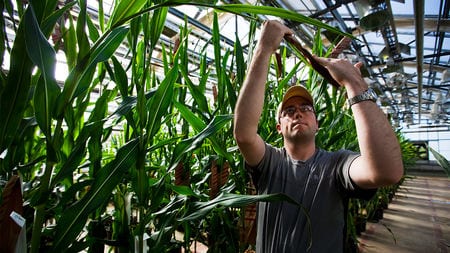
Many new varieties of genetically modified crops will be exempt from regulation in the United States under a new policy.
Brent Stirton/Getty Images
A major change to U.S. regulation of biotech will exempt some gene-edited plants from government oversight. The new policy, published in the Federal Register today, also calls for automatic approval of variations of established kinds of genetically modified (GM) crops, easing their path to market.
Industry groups are welcoming the new rule, whereas opponents are decrying the reduction of government oversight.
“The main good thing is that it will allow certain aspects of gene editing to move forward,” says Kent Bradford, a plant geneticist at the University of California, Davis. If researchers use gene editing to design a plant that could have been bred conventionally, the new plant will be exempt from regulation. But anything else—such as moving a gene between species or rewiring metabolism—will still require a regulatory review.
The gist of the shift is that the U.S. Department of Agriculture’s (USDA’s) Animal and Plant Health Inspection Service (APHIS) will now focus on new traits themselves rather than the technology used to create them, a change of approach that plant scientists have long wanted. Several reviews by the National Academy of Sciences have concluded that the risk that GM plants will become weeds is generally low, and that molecular tools typically don’t pose new risks compared with traditional plant breeding techniques.
The change to the USDA regulations began during the Obama administration. The Trump administration released draft rules in January 2017, then withdrew them 9 months later. (In its new rule, USDA says it received comments that the previous version would be “too burdensome and had the potential to stifle innovation.”) Last summer, USDA released a revised rule for public comment, which it has now finalized.
An engineered plant won’t be regulated if it contains minor changes—a change to a pair of amino acid bases or a deletion of a chunk of DNA—that would create a trait that could have been made through traditional breeding. For example, molecular biologists can snip disease resistance genes from various parts of a plant’s genome and gather them into one stretch of DNA, allowing breeders to easily incorporate all the genes into one variety. The end product will be the same as what might be created by breeders, but gene editing can save years of effort, Bradford says. “This makes everything hugely easier.” But he’s frustrated that the exemption doesn’t cover more substantive changes or moving genes between closely related plants, such as peppers and tomatoes, which can’t be crossed with conventional breeding.
Another change will make it easier to create minor variations of GM crops, such as tailoring them for different climates. Before, companies had to ask APHIS to evaluate the risk of any new GM crop they wished to commercialize, even if it had been altered in the same way as crops already approved. Now, APHIS won’t regulate new varieties of an already approved GM crop.
If a company isn’t sure whether its new crop is exempt, it can consult APHIS. Regulators will look at the proposed trait in comparable plants to see whether there’s any risk. The agency expects that such reviews could be done in 2 to 3 months for familiar plants. APHIS estimates that about 1% of plants might not qualify for an exemption, or deregulation after an initial review. That’s welcome news to plant developers. “The new process established by this rule is expected to lead to lower regulatory costs and timeframes for the development of new plant varieties,” the American Soybean Association said in a statement.
APHIS says it wants to keep up with evolving science and technology. Research institutes, companies, or other stakeholders can ask APHIS to expand the exemptions, a process that would involve public comment. “A clear and transparent, science-based process for these future exemptions will be important to support continuing innovation,” said the American Seed Trade Association in a statement.
Some groups are concerned that companies won’t have to notify USDA of biotech crops they will bring to market that are exempt from regulation. “The result is that government regulators and the public will have no idea what products will enter the market and whether those products appropriately qualified for an exemption from oversight,” Gregory Jaffe of the Center for Science in the Public Interest said in a statement.
The Biotechnology Innovation Organization (BIO), a major trade group, appeared to encourage companies make public such releases. “BIO encourages increased openness about products entering the marketplace,” it said in a statement.
Most of the new changes will go into effect on 5 April 2021.








